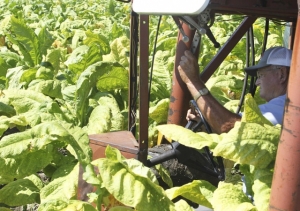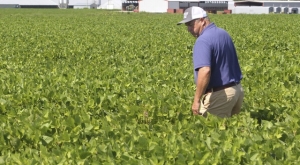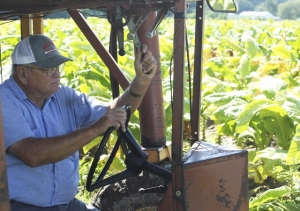Rain, a bountiful blessing -- but it comes with some uneasiness for farmers
By Steve Herring
Published in News on August 10, 2018 5:50 AM

News-Argus/STEVE HERRING
Alfred Parks harvests tobacco Thursday afternoon in a field on U.S. 13 North. All of the recent rains helped the crop, but moisture is a concern.

News-Argus/STEVE HERRING
Extension Service field crop agent Daryl Anderson checks the conditions of a soybean field on Hare Road Thursday morning. The recent rains have revived the crop that had been suffering because of the heat and drought.

News-Argus/STEVE HERRING
Parks harvests tobacco Thursday afternoon in a field on U.S. 13 North. Along with the moisture concerns, farmers have a second worry about all of the tobacco turning loose, ripening at the same time and not having enough barns to put it in before it falls off the stalk.
Alfred Parks wasn't too concerned that his tobacco field was still soggy from all of the recent rains -- his harvester has four-wheel drive.
What concerns Parks, who has been farming for more than 50 of his 70 years, and other farmers across the region, is how all of the moisture will affect how quickly the leaf ripens.
The rains could not have come at a better time, as drought and heat had been exacting a toll on tobacco, soybeans, cotton and corn.
The rain came too late to save the corn crop.
Wednesday and Thursday, Parks was making his first rounds in his tobacco field on U.S. 13 North in the Hoods Swamp community.
"It (tobacco) was dry, and it looked bad," said Parks who farms 145 acres. "The crop is looking right good. The rain done good.
"If we hadn't had rain we would be in trouble sure enough. We have seen enough rain now. We need a few fair days now."
About half inch of rain fell overnight Wednesday, while just a short distance away the area where his barns are located did not receive as much, he said.
"It looks right good now, but I am scared," he said. "I am afraid it is going to come out the field too fast. It is already starting to happen."
It is a concern shared by farmers across the region that the crop will ripen too fast putting a strain on the harvest and barn capacity.
Asked if his 25 barns would be able to handle the crop if that happens, Park said no.
The cropping schedule will hinge on how quickly the crop ripens, but Parks expects to be back in the field next week.
"We have got to," he said.
It has been a multimillion-dollar rain for tobacco, soybeans and cotton, if it will hold off now, said Daryl Anderson, Wayne County Extension field crop agent.
"If it will get dry so they can get into the field, (then) really the only thing that is affecting (it) is the tobacco," he said. "They just need to be able to get into the field to get it out.
"I am 49 years old and this is the first time I can ever remember people not being able to start putting in tobacco until August. There were some people who started in July and they have had to stop for about a week for the rain."
One thing that the rain has done, it's not necessarily too wet, in place it is, but the tobacco when it was so dry it had turned so yellow.
"Once this rain came, this rain has made it turn back green, and they can't harvest it while it is really green because when it comes out of the barn it is too green and the companies don't want it," he said.
"Now they are having to wait for it to get ripe, for the fertilizer to get out of it. My concern and a lot of concern farmers I have talked to all over the county have there are two things."
"No. 1 they are starting late. They are hoping they can get the crop out of the field before it frosts in October or early November."
The second thing: They are scared that nothing will hold on -- it's all going to turn loose and ripen at the same time -- and they won't have enough barns to put it in before it falls off the stalk.
Farmers do not know which way it is going to go, he said.
It is not just an issue for Wayne County farmers, he said.
The same holds true for Johnston, Wilson, Greene, Lenoir, Duplin Sampson -- they are all in the same situation.
If that happens barn space will be at a premium.
Anderson said he spoke with a farmer last Monday who had just purchased five barns.
"I think he told me that put him at 60 barns. That's all he can handle in a week, even if he had some more he couldn't fill them up. They can't fill up but so many a week.
But as far as the tobacco crop, it's completely different than it was two or three weeks ago when it looked like it was going to dry up, he said.
"But now, I think we are going to have a good crop," Anderson said. "It's got good body in it. I think they are going to have some good weight, if they can save it. That's going to be the key."
Mudding the picture is that no one knows what the rain is going to do, Anderson said.
"I mean it keeps raining every night," he said.
Despite the at-times heavy rains, Anderson said he has seen only a couple of acres countywide out of nearly 7,800 planted that have been drowned.
Some people were going to start this week but because of the rain they cannot get into their fields, he said.
It is either too wet or too green, Anderson said.
"I am sure that anybody who can get in the field, they are probably going to try to go ahead and get started if they can," he said.
However, some people are cropping, he said.
Spraying worms nothing really caused by the rains.
The rain in some fields has caused disease.It has caused some Granville wilt. It has caused some Fusarium wilt.
Combination of dry and wet weather, he said.
The rains have helped the soybean crop a lot, he said.
"They were really struggling back when it was dry," Anderson said. "They are coming on pretty good now. The only thing they are worried about right now are worms. That is a simple fix, you just spray at the right time.
"I think the biggest concern right now is the price. They are still low. There are some farmers who did book some for $10 or so, but right now they are below $8. So they are not getting a lot for their soybeans right now. That may change."
Anderson said he thinks the county has had enough water to get the soybeans to where they need to get to in September, Anderson said.
"We have enough water to make the cotton. We should have an excellent cotton crop if nothing happens.
As a matter of fact the timing for the rain was almost perfect for cotton, he said.
"If we could get this rain to get out of here by September when its starts opening, we should have a wonderful crop," he said. "Now if it keeps raining in September, it could ruin the cotton crop.
Peanuts and sweet potatoes are looking good, too, because of the rain, he said.
